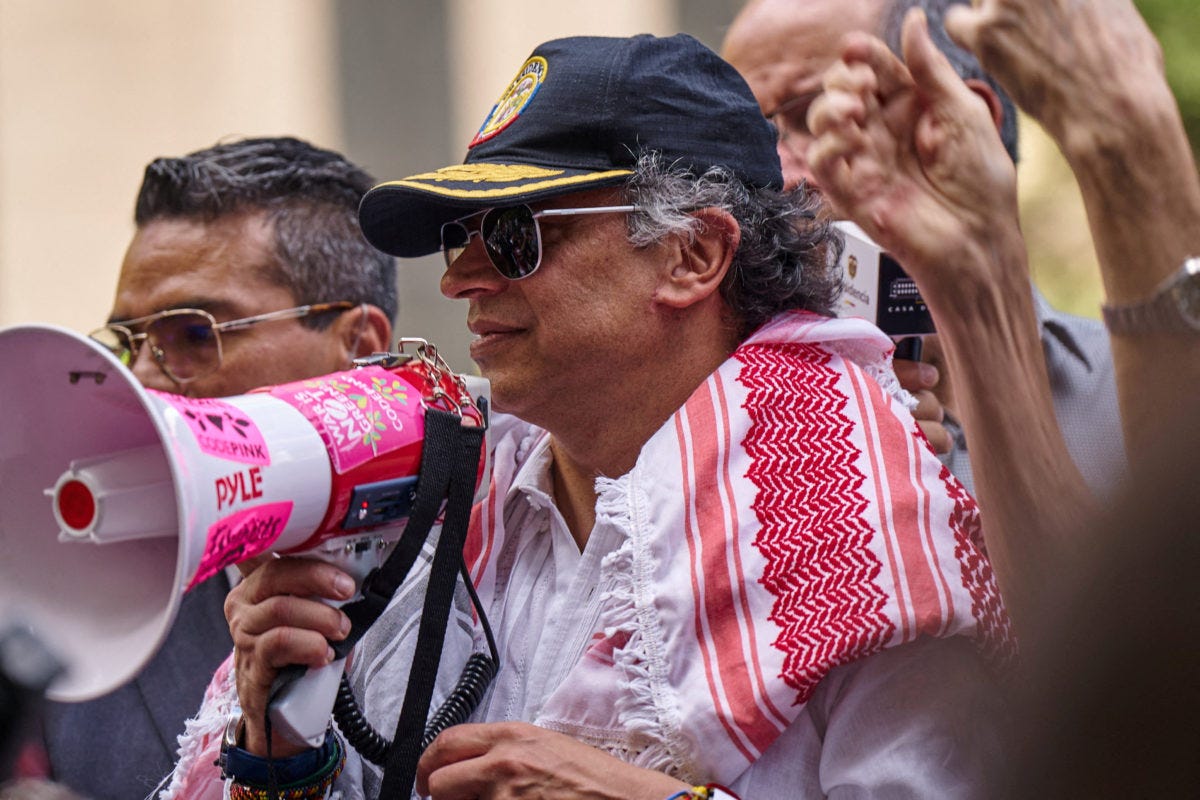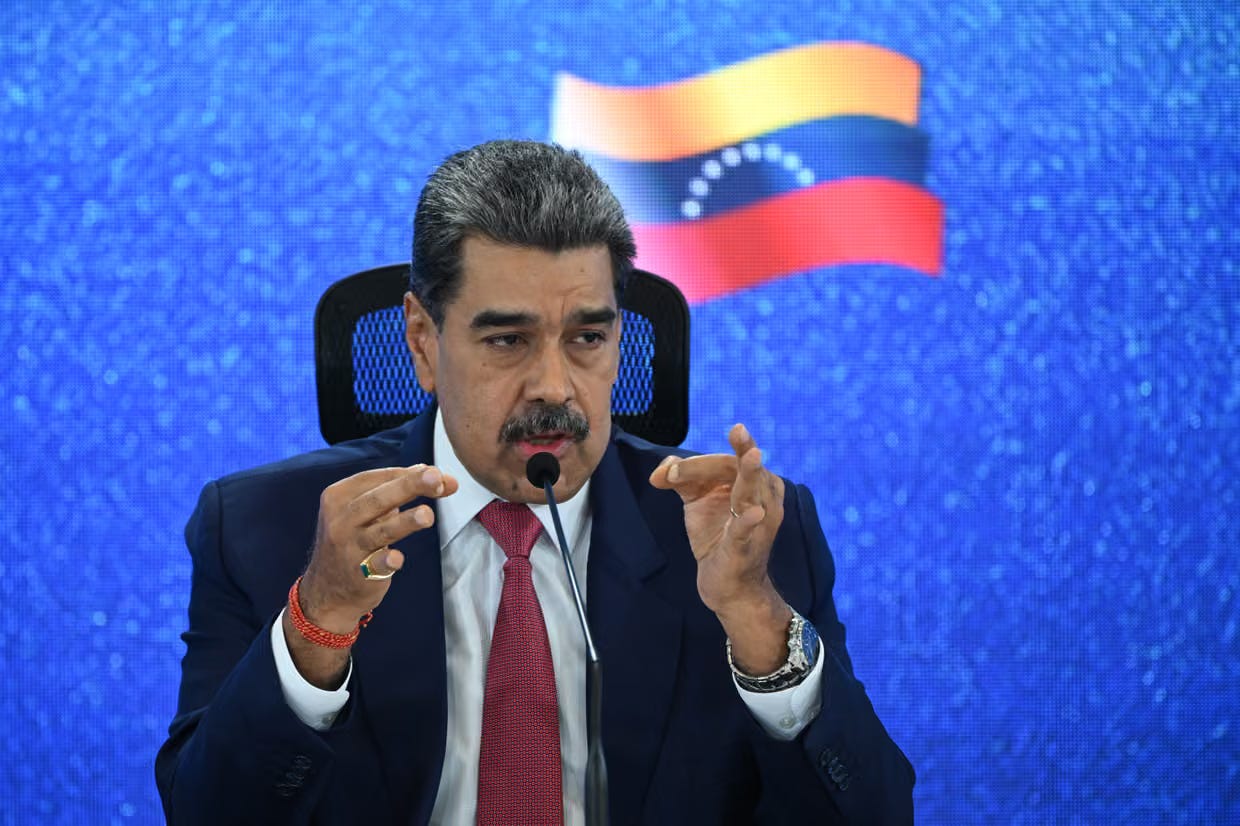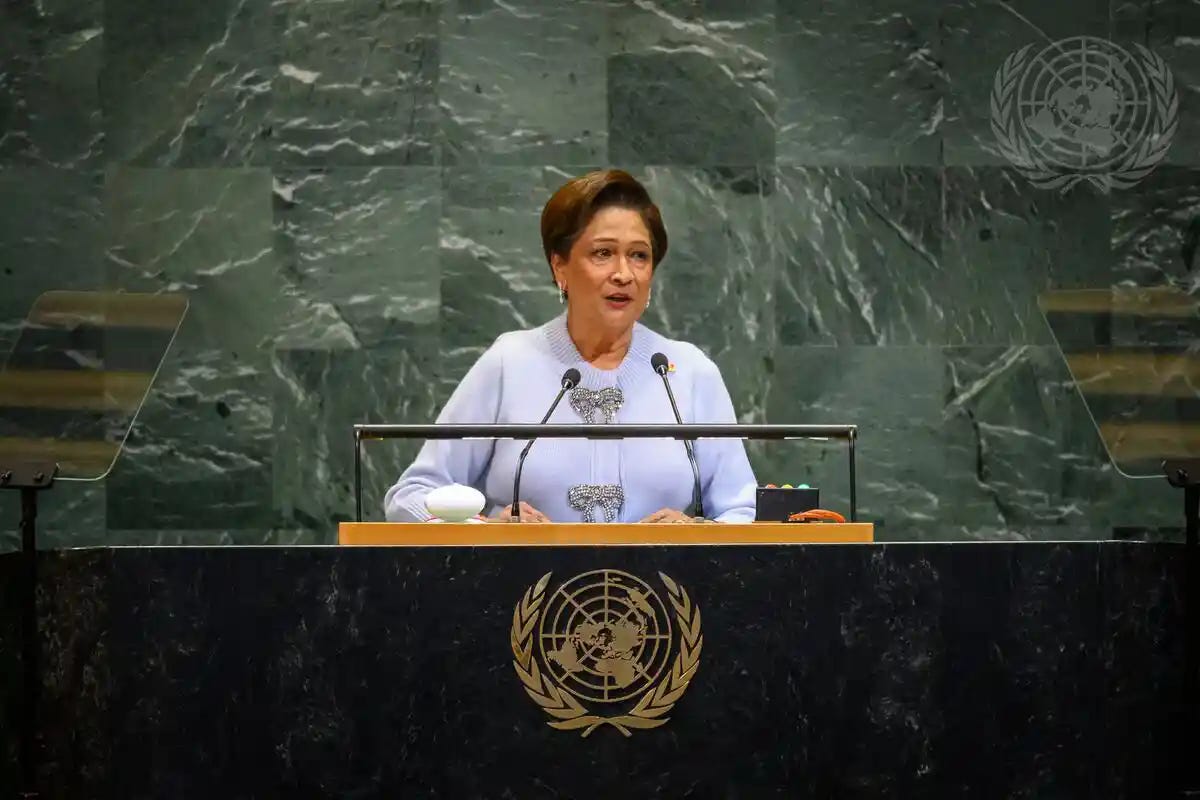More foreign affairs in a crazy, mixed-up world
Dear Leader's not-so-stealthy lead-up to war against the Caribbean and South American, country by country
Is a new kind of undeclared, selective war afoot for the United States? One that will start with military attacks against one country—targeting alleged drug smugglers, such as those purportedly acting on behalf of Venezuela’s government—but gradually spreads to punish leaders of other countries which decline to join the war or endorse U.S. foreign policy objectives (Colombia), or which otherwise displease U.S. strategists (Brazil, Grenada)?
The Trump administration has already begun what resembles a long-term war against drug smugglers in the Caribbean, by destroying three small vessels off Venezuela in international waters with targeted missile strikes in September. Rather than apprehend and arrest the suspected traffickers, as in years past, and display the seized drugs as evidence in a courtroom, the U.S. military has simply obliterated them all—leaving no evidence behind. So far, at least 17 men have died—with no apology and no accountability. We are asked to take the U.S. government’s word for their guilt, as judge, jury, and executioner.
And on that subject, at least one of the men killed now appears to have been an innocent fisherman targeted in error, despite the Trump administration’s claims to the contrary, according to a New York Times report from Caracas. His widow claims “her husband was a fisherman with four children who left one day for work and never came back.” [See “Fear and hope in Venezuela as U.S. warships lurk,” September 29, https://www.nytimes.com/2025/09/28/world/americas/venezuela-mood.html .]
And there are ominous rumors emanating from Washington of ongoing preparations for actual strikes inside Venezuela itself, tantamount in the past to a declaration of war—but without any real substantiation of any threat to U.S. security, and lacking any explicit authorization from Congress, even the hope of seeking one. All while deportation flights from the United States continue. [See “US preparing options for military strikes,” September 26, https://www.nbcnews.com/politics/national-security/us-preparing-options-military-strikes-drug-targets-venezuela-sources-s-rcna233734 ; and “US ramping up activities in the South Caribbean,” September 19, https://www.caribbeanlife.com/us-ramping-up-activities-in-the-south-caribbean/?utm_source=sailthru&utm_medium=email&utm_campaign=caribbeanlife-pm&utm_term=Caribbean%20Life%20Daily%20Newsletter .]
Countries across the Caribbean and South America are slowly being pressured to choose sides ahead of any forthcoming strife. So far, only Trinidad and Tobago, Venezuela’s nearest eastern neighbor, and Guyana have emerged as supporters of the destruction of alleged drug smugglers’ boats—a point firmly underscored by Trinidad’s prime minister this week in her speech at the UNGA. Meanwhile, western neighbor Colombia has established its firm position in the opposing camp, leading to the State Department’s revocation of that country’s president’s A-1 travel visa (if only after he left New York).
Colombian President Gustavo Petro, speaking at a now-infamous New York rally. Courtesy AP
[See “US revokes Colombian president’s visa,” September 26, ttps://www.bbc.com/news/articles/cz9jv8kne7no?utm_campaign=AFSA%20Media%20Digest&utm_medium=email&_hsenc=p2ANqtz-9KxDI7S0DwrVgxXPLC_jD75KT24IEaxHiSKk59pUgHtisIj0D3JvTK46qiDIFo-Zsv5wPXwhZNRBdzbVnuGfDKj5GPpg&_hsmi=382730244&utm_content=382730244&utm_source=hs_email ; see also “Trinidad, Guyana Support US in Moves Against Venezuela,” August 25, https://www.caribbeanlife.com/trinidad-guyana-us-moves-venezuela/ .]
As tensions mount between Washington and Bogota—once one of the strongest U.S. allies in South America—that country’s foreign minister has “renounced” her own U.S. visa in protest, her government said Monday. The worsening rift could soon lead to a downgrade or open break in diplomatic relations. [See “Colombia’s foreign minister ‘renounces’ her visa,” September 30, https://apnews.com/article/colombia-foreign-minister-us-visa-petro-6d8d32a3694a3d90b225ec013b4b18fd .]
But the troubling precedents being set by this unusual U.S. military action—which some critics call extrajudicial murder, violating, as it does, international treaties against arbitrary aggression on the high seas during peacetime, as well as standards of ordinary justice for those accused of crimes—are couched in an even more unusual context: provocative and punitive actions against those who disagree with the legality or wisdom of the strikes.
A page back in time ... is a reader-supported publication.
To receive new posts and support my work,
please consider becoming a paid subscriber.
* * * * * * * *
As a “reformed” Foreign Service Officer—I walked away from the U.S. State Department in 1997—I keep my eyes out for unusual and outrageous events occurring in countries of interest to the United States, particularly those I have served in or visited. This often includes analyses of U.S. actions affecting those countries, whether wise or effective—or neither, as here—and in many recent cases, more puzzling than practical.
Map of Venezuela and its neighbors. Courtesy Encyclopedia Britannica
I have never visited or lived in Venezuela, but lived for a time in the region, when I was posted to Suriname, two countries away, in 1989 and 1990. I have since observed its long and troubling descent from fairly stable democracy to the shambles of a vindictive, authoritarian state over the past three decades, since the appearance of the slightly comical Hugo Chavez as strongman—and more recently, the ludicrous example of his successor, Nicolas Maduro.
Maduro is not unfairly ridiculed as a garbage truck driver gone berserk, once in charge of a government: an oafish clown squandering a once-affluent country’s future and oil wealth through greed, mismanagement, and sheer stupidity. It is difficult to survey the current state of Venezuelan politics and its erratic, collapsing economy—annual inflation lingers at nearly 200 percent, with the bolivar currency nearly worthless—without wondering what fresh hell comes next there.
With a full quarter of his population already having fled the terror and repression of a devastated society, Maduro has stolen two consecutive elections in which he was apparently defeated decisively—had actual ballots been fairly counted—all while daring the international community to do anything about it.
In 2019, he effectively broke diplomatic relations with the United States, angrily expelling one former U.S. ambassador who dared to criticize his actions. The $25 million U.S. bounty on his head has recently been doubled, further restricting his ability to travel outside Venezuela.
Venezuela’s disputed and dyspeptic president, Nicolas Maduro, speaking in Caracas. Courtesy Agence France Presse
Since then, our Caracas embassy has been closed, then relocated in 2019 to our embassy in neighboring Colombia. How much longer it will continue to operate there is anyone’s guess, particularly if Colombia’s leftist president, now our open critic, decides to take retaliatory action against the United States for its recent discourtesy to him.
Indeed, it was not Gustavo Petro’s criticism of the military strikes which prompted his official travel visa to be revoked—but rather the greater sin of taking part in a pro-Palestinian, anti-Netanyahu rally outside the UNGA, in which his “incendiary remarks” reportedly included asking U.S. soldiers to disobey their commander in chief—not, surely, the most prudent thing to say as a guest in this country.
From experience, Colombia should have known better than to take Venezuela’s side in the battle to come, after having welcomed millions of Venezuelan asylum-seekers in recent years, with little hope of returning them in the near future. It is difficult for even detached observers to have much sympathy for the redoubtable Senor Maduro, whose wild and paranoid charges against so many foreign leaders seem to reveal a brain atrophied by too much alcohol and too little common sense.
Now Gustavo Petro is fast approaching Maduro’s level of buffoonery. Some will say Colombia’s leader brought this on himself, by donning a Palestinian keffiyeh and loudly joining a public rally in New York—like waving a red flag at an already-enraged bull. Like Maduro, he will probably find few defenders for his more provocative remarks. He will probably not be allowed back into the United States for the duration of his term—and may, like Maduro, even find a bounty on his head soon.
Yet even these truths provide no conceivable justification for the latest Trump administration moves. The recent charges by Dear Leader and his minions that Maduro has resorted to narco-terrorism to fund his lavish lifestyle, making international—read, unilateral U.S.—action suddenly necessary to bring down his regime, ring alarmingly opportunist and hollow.
Worse, they are quite possibly counterproductive, building a measure of sympathy for the beleagured leader outside his circle of usual suspects, notably fellow dictators in Cuba and Nicaragua. [See “Nicolas Maduro ready to declare state of emergency,” September 29, https://www.theguardian.com/world/2025/sep/29/nicolas-maduro-venezuela-state-of-emergency-us-military .]
Worse, it follows a string of unprecedented cancellations of visas for U.S. travel by lesser-known figures with only tenuous connections to major matters of state: the wife of a Brazilian judge who figured in the recent trial of Trump ally Jair Bolsonaro [See “Trump administration sanctions wife of Brazilian judge,” September 22, https://apnews.com/article/brazil-sanctions-wife-de-moraes-af7d52b4f261fca0a76a15625d22172c ] and the pointlessly silly restrictions (related to his past support for Cuban medical providers) placed on a visa for a top Brazilian health aide, who decided not to travel to the UNGA rather than endure virtual “hotel arrest” while there.
Or, indeed, the petty cancellation of all of Grenada’s Finance Minister’s visas—official and personal—and even that of his ex-wife, after that tiny nation dared to stand up to Miniscule Marco’s demand that it end its contract with Cuban medical providers. [See “US withdraws visa of Dennis Cornwall,” August 15, https://www.thenewtodaygrenada.com/local-news/u-s-government-withdraws-visa-of-dennis-cornwall/ .] The dunderheaded list goes on.
But the ripples of the not-so-stealthy war being waged by Miniscule Marco and his half-witted henchman, breast-beating Secretary of War “Petulant Pete” Hegseth, are now threatening the serenity and solidarity of the Caribbean Community. Caricom’s leaders have privately pleaded with Trinidad’s obstinate Prime Minister, Kamla Persad-Bissessar, not to discard their long-held self-image as a “zone of peace” by offering her country as a base for future U.S. attacks. Their appeals, sadly, were to no avail.
Trinidad and Tobago Prime Minister Kamla Persad-Bissessar, at UNGA. Public domain photo
On Friday, she clearly cast her lot with the United States, vehemently rejecting the “zone of peace” image as “a false ideal”:
The reality is, stop, no such peace exists today. For too many in our region, peace is not daily life, but an elusive promise, glimpsed and never grasped. In its absence, our citizens pay a terrible toll … And many of them are gang-related. So, the reality is, being a zone of peace is still an elusive dream that we’re pursuing.
[See “T&T begs to differ with CARICOM on military build-up in region,” September 29, https://www.caribbeanlife.com/tt-begs-to-differ-with-caricom-on-military-build-up-in-region/ .]
With her own military underfed and in tatters, despite the country’s oil wealth, she clearly feels unable to defend her tiny islands against the twin scourges of illegal drugs and gang violence without significant outside help. Yet her early speeches on the matter have sometimes bordered on the shrill, unusual for such an experienced politician—and briefly sparked a bizarre rant by one of her junior ministers that India might intervene with nuclear weapons to stop Venezuela’s encroachment [See “T&T Minister’s baseless claim,” September 19, https://www.caribbeanlife.com/tt-ministers-baseless-claim-india-would-nuke-venezuela-for-trinidad-draws-outrage/ .]
Gang violence is a hot political topic for Persad-Bissessar, who was returned to office only this past spring largely on that issue. She freely paints Venezuela, her closest neighbor, as the culprit for it—and seems to welcome killing off potential drug smugglers before they can get there as a crucial first step. Perhaps what she has been offered in return is, in fact, for the good of her country—but at what cost to regional stability?
The more troubling question: how many, if any, Caricom nations will follow her lead? If no one else backs her, will she threaten to withdraw Trinidad from membership in retaliation? The damage already rendered to unity among the countries to our south in the Western Hemisphere is beginning to show, as alliances fray and unrest spreads. It will be difficult to repair hemispheric unity if the situation worsens, as it most likely will, in the months ahead.
It is a given that the case for unwarranted U.S. aggression will arise in the forum of the Organization of American States at some point, perhaps sooner than later. When it does, that U.S.-dominated group, long notable for ineffectiveness and subservience in the past, may never give the issue a truly fair hearing.
Already moribund and limping, the OAS doubtless remains fearful for its very existence if it should cross the United States. Its once-vaunted Rio Pact, which has supposedly preserved the hemisphere against external threats for nearly 80 years by promising joint action against any external aggressor, is all but worthless now, with many members already having withdrawn.
But if and when thias prospective case does arise, more and more OAS members, both large and small, may well recall their increasingly cavalier treatment at the hands of Dear Leader’s conscienceless minions—and vote for a different kind of future regional vision: one filled with fragmentation and distrust, rather than friendship.
And that, dear readers, is a troubling prospect indeed.
Next time: More foreign affairs in a crazy, mixed-up world





